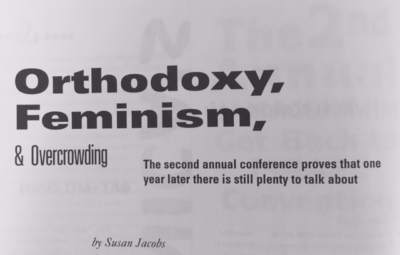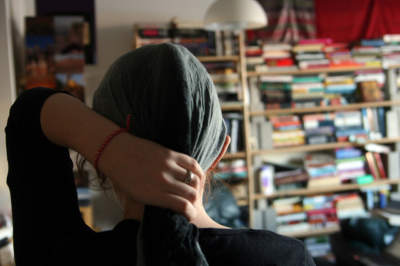“…the Rabbinic Panel has made clear that women serving in clergy roles or holding clergy titles is at odds with halacha…” read a statement by the Orthodox Union on women’s ordination.
This month’s controversial OU ban on female clergy roles came on the heels of an Orthodox event advocating just the opposite – JOFA 2017.
But, this year, conference programming included a unique discussion of Orthodox women’s leadership roles on campus.
“I grew up in this [Orthodox] community feeling very connected and very involved, and also as a woman, feeling not involved in many things and being shut out,” said Miriam Charak, a first year at University of New South Wales in Sydney, Australia.
Want more on JOFA? Read: Women of the Words: Finding my Voice as an Orthodox Feminist
Charak attended JOFA’s pre-conference College Leadership Shabbaton – co-hosted by JOFA, Yeshivat Chovevei Torah, and Yeshivat Maharat. While JOFA held its first college shabbaton in 2015, this year was the first time a college program was planned in conjunction with the conference. According to Shira Eliassian, JOFA’s project manager, the goal was to create a space for Jewish college students to connect and share their diverse experiences as Orthodox Jews on campus. Ultimately, 45 students and recent graduates attended, representing 24 schools from five different countries and a diversity of Orthodox backgrounds.
For Charak, meeting the other students was particularly powerful. She recalled feeling inspired when a Shabbaton facilitator told the group that they were a part of a global community of Jewish student feminists. “She said, ‘Many of you might be coming from communities where you’re the only ones who care about feminism, but look around the room. You have all of these allies,’” Charak said. “…it was nice to look around this room, and all these people feel like you.”
For student attendees like Rivkie Reiter, a junior at Yeshiva University’s Stern campus, Orthodox feminism has sometimes felt like a more solitary battle. As a Beis Yaakov graduate, she was empowered by her all-female environment but also found herself at odds. “I was already a feminist before and fighting with my teachers at school and getting shut down because sexism didn’t exist, the wage gap didn’t exist, and I was the crazy feminist,” she said. “I went to Israel and learned that women could read Talmud and go to college and get real degrees.”
Now, at an Orthodox college, she finds her experience to be different from those of students on other campuses. “We don’t have the diversity of most secular college campuses,” she said. “The issues are all framed differently…” She described an “uphill battle of raising awareness and raising education.”
Campus professionals also weighed in on the Orthodox feminist experience in college in a conference session titled “University of Change: A Campus Perspective on Orthodox Feminism.”
The panelists, Binghamton Hillel Director Nataly Weiss and Columbia OU-JLIC (Jewish Learning Initiative on Campus) Rabbi Noam Friedman, addressed opportunities for women’s leadership on campus and the challenges Orthodox feminists face when they graduate.
Want more on JOFA? Read: I Am Dedicated: What Should Orthodox Feminism Look Like?
Both speakers focused on the unique Jewish pluralism of campus communities as an opportunity for Orthodox students to grapple with gender roles in new ways.
“In a campus community, you’re able to explore other aspects of Judaism… things that you may not feel is the norm based on how you grew up in your communities,” Weiss said. For her, that level of Jewish diversity and the exploration it inspires is “the best part of college.”
“[At Hillel], you’re going to have a Reform rabbi come in or a Conservative Rabbi or Jewish yoga teacher from some denominational background you never heard of speaking about Jewish texts – or whatever it may be,” she said. “And you can go to all of that and figure out, ‘Is there a place for this in my Orthodoxy?’”
The two speakers emphasized that diverse Jewish communities often mean more expansive roles for Orthodox women. At Columbia, women serve as “gabbanits,” or female gabbais, who help assemble minyans each week, Friedman said. And, at Binghamton, the Orthodox student community has a woman president – which, as Weiss pointed out, is still a debatable role for women on the boards of some Orthodox synagogues.

Women on campus also actively teach Torah, which Friedman stressed as a source of empowerment.
“It’s Torah for everyone, not the Torah only for women or only for men,” Weiss added.
But, for Orthodox feminist students, the opportunities they experience in college pose a challenge when they graduate – mainly high, and sometimes unmet, expectations for their future Orthodox communities.
Shira Eliassian, the panel’s moderator and a recent Barnard graduate, said that, after college, she assumed Orthodox feminist practices on campus were more widely accepted in the Orthodox world.
“…You start to take for granted things that happen without questioning,” she said. “Like, ‘Of course there’s going to be women’s megillah reading,’ or ‘Of course a woman is going to carry the Torah on Simchat Torah…’”
But when she mentioned these opportunities for women’s leadership off campus, she was met with puzzled comments at Orthodox Shabbat tables. “You can just do those things and not think twice about it in a campus community,” she said. “Then, there’s a resistance…”
At the same time, the openness of college Jewish communities can act as an incubator for Orthodox feminism, enabling students to decide what they want their Jewish practice to look like post-college, Weiss noted.
“Push the envelope beyond what you were taught for 18 years,” she said. “Ask, ‘Why? How? What? When?’ You have to walk away from college and say, ‘Who am I? What community do I want to go to?’”
For JOFA’s student participants, perhaps the biggest question is, what communities do they want to create after life on campus?
“I’m not doing this feminist thing and expecting to drop it at the end of college…” said Reiter. “I’m not living with that [attitude] lurking in the background of, ‘Soon I will return and be forced back into that old mold.'”
Sara Weissman is the editor in chief of New Voices Magazine. Kvetch or kvell to her at editor@newvoices.org. Hannah Weintraub is a senior at the University of Pittsburgh, majoring in History and Fiction Writing with a minor in Jewish Studies.


